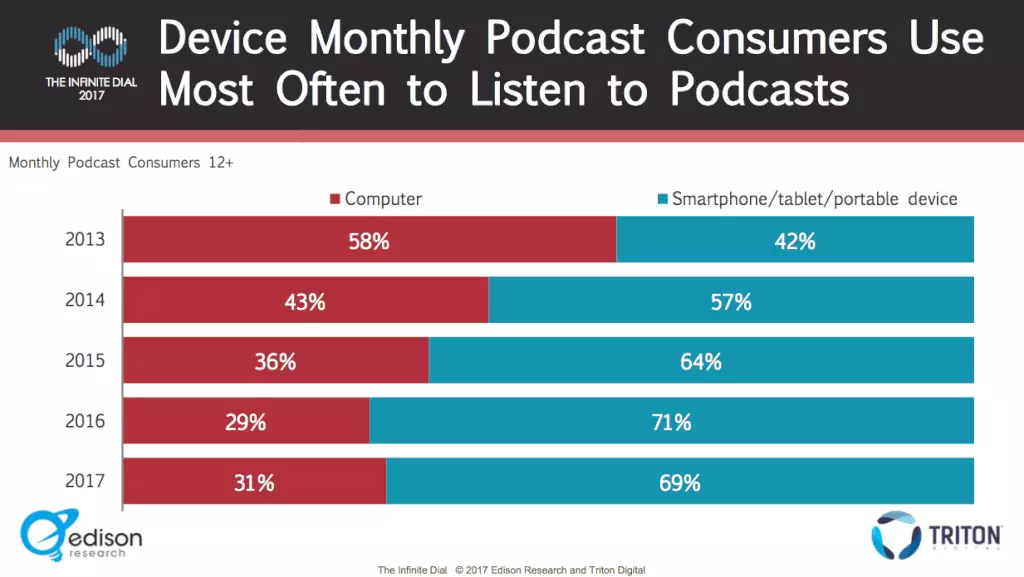13 Tricks to Build an Awesome Brand Using a Podcast in 2024

The podcast has been around for more than a decade and has made the rounds more of a convenient way to get news or a radio broadcast on demand. However, podcasts have bloomed into a great way to do marketing in 2024, when popular podcasts such as Serial attracted the attention of a mobile population. Podcasts became so popular that big companies were willing to bet on them to engage customers.
However, not all companies have the resources to commission a branded podcast series by established podcast producers, or even a mention on a popular podcast. The next best thing, then, is to launch your own podcast to build your brand.
Before you start to panic, consider that podcasts are not really that much different from blogs. The idea behind either medium is to present information that your target audience wants or needs and develop a relationship with them at the same time. You also use a certain tone to express your personality and establish a rapport with your audience. The main difference is that blogs use text, and some graphics, while podcasts use audio, and some videos.
The biggest advantage of podcasts over blogs is that the audience prefers audio-based entertainment. They can do other things while listening, which they can't really do while reading. This is why 42 million Americans listened to podcasts weekly in 2017, and most of them play it on a mobile device.

Podcast also tend to create loyalty and passion among listeners once you catch their attention. On the other hand, podcasts require a little more preparation than blogs, although it can be a lot of fun as well. Here we present 13 tricks to build your brand using a podcast.
How to make a podcast
-
- Act quickly. The most important trick to a successful podcast right now is to do it already. You need to jump on the bandwagon before it gets too crowded. There are 250,000 podcasts available on iTunes alone, and the competition for a spot in the 5 to 6 hours a week people devote to listening to podcasts is stiff. Act now if you plan to start a podcast, and make every effort to do it properly.
- Find your niche. Despite the daunting number of podcasts available today, you can still make your mark as a podcast host if you offer something no one else is already offering. You have to give people a reason to listen to you instead of other podcasts in your industry. Sometimes, it is just a matter of making your voice and delivery more appealing to your target audience. People can tell when you are being genuine, so let your personality shine through. Check out these top podcasts for 2017 to guide your own journey to finding your voice and niche.
- Know your audience. Any successful marketing strategy begins with the audience. Who are they? What are their needs and wants? What topics are most likely to interest them? You have to remember that your podcast is for your audience, so you need to cater to their interests and issues. Find out what questions your audience asks by checking forums, competitor blogs, or your own blog to mine likely topics in the comments. Start a conversation on them, and take it from there.
- Prepare your script. You need to write down what you are going to say, even if it is just a guide. You can be as spontaneous as you want during your podcast, but a written guide will keep you on point. Bookmark these blogs for some writing tips and advice if you want. Writing it down will also help you keep to your preferred time limit, so you won't keep babbling on long after your audience has lost interest.
- Use good recording software.It will allow you to capture professional-sounding audio for your episodes and also provide tools to edit the audio by removing unwanted noises or sections, and adjusting the volume and sound levels.
-
- Establish yourself as a resource. Growing your brand is a continuous process, so you have to establish yourself as the go-to guy for your niche. The best way to do that is to give them value. Provide them with interesting insights, practical advice, or timely entertainment, and they will keep coming back for more. What's more, they will recommend you to friends and family, so you will grow your audience exponentially. Establishing yourself as a resource is just the best way to market your brand in any niche.
- Keep to a regular schedule. Consistency is the key to keeping your audience engaged. People that subscribe to your podcast will expect you to upload a new session on a regular basis, and you don't want to disappoint them or you will lose them. Most podcasters upload weekly, but you can choose to do so monthly if you find a weekly cast a bit much. The important thing is to decide on a schedule, and stick to it.
- Use branded short links. The main purpose of your podcast is to promote your brand, so you want people to remember what it is. You should use branded links to your site because people can remember them and share more easily than generic ones, even if they are just as short. Additionally, branded short links remind your listeners about who you are and what you represent.
- Make your mark. If you want people to check out your new podcast, you have to make sure your artwork is impeccable. You might think graphics is extraneous for podcasting, but that is not the case at all. Most people really do judge a book by its cover, and the same applies for podcasts. Professional-looking artwork stands out, and makes it easier for your audience to find you. Make your mark each time you upload a new podcast by following these guidelines to making great cover art.
- Tag and bag it. Make your podcasts searchable by using ID3 tags and setting up your RSS feed. The tags provide more information about your podcast, such as the title, episode, year published, genre, URL, and relevant keywords. Setting up your RSS feed makes your new podcast available to your audience for download. When you make it easy for people to find you, you are more likely to get new subscribers.
- Collaborate. Other podcasters can be a great resource for new podcasters, so make an effort to develop friendly relations with them. You can pick up some pointers from established podcasters, and you might even do some cross-promotion with them for your mutual benefit.
- Keep an open mind. While iTunes is a good place to submit your podcasts, you should not limit yourself to just there. You should explore other directories such as Stitcher, Miro Guide, and Google Play Music to widen your reach beyond Apple device users.
- Do interviews. You may be hugely charming and entertaining, but it is always good to mix it up a bit occasionally. Find successful people in your niche who may be willing to sit down for an interview or converse with you on Skype to provide some fresh material for your podcasts. Prepare a list of interesting and/or controversial questions to ask (make sure you send it ahead of time for the interviewee to vet) and test your recording equipment to make sure you have good audio.
- Promote your other channels. Your podcast is a good way to promote your website, but don't forget about your other platforms. Invite them to follow you on your social networks, especially if you have interesting posts related to your current topic. This will generate more activity for these platforms and potentially expand your network.
Podcasting is a relatively new kid on the marketing block, but it has the potential to be a very important driver in brand recognition. What's more, if you act quickly, you could be the first one in your niche to do so, and that can pay huge dividends. Use podcasts to build your personal or business brand effectively using these tricks, and have fun doing it!
About the Author
Taking a direct approach in all of her articles, Laura Buckler makes the top list of best freelancers in the country. Her previous experience in marketing - both digital and social - make Laura a valuable content writer. Follow her on twitter.